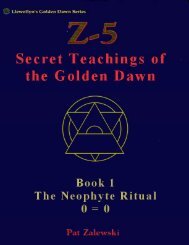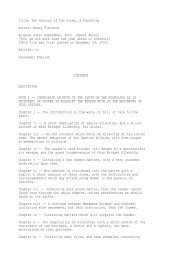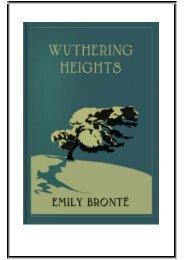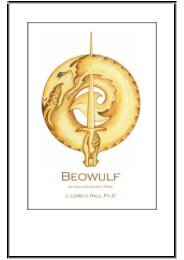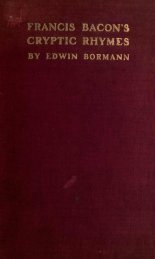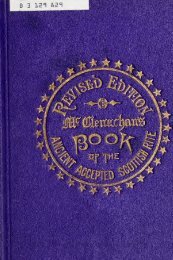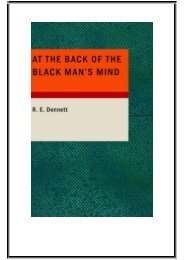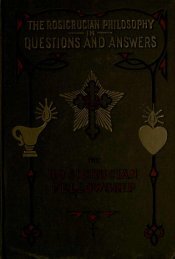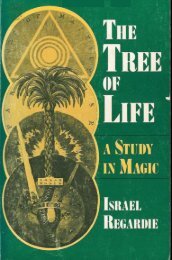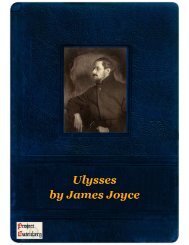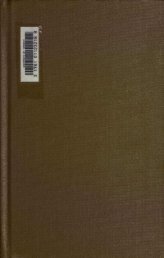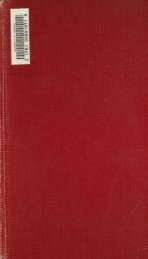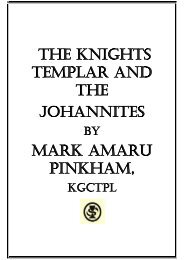- Page 2:
ftmtj Presented to the LIBRARY of t
- Page 7:
THE REAL HISTORY OF THE ROSICRUCIAN
- Page 10 and 11:
vi ANALYSIS OF CONTENTS. CHAPTER TH
- Page 12 and 13:
Vlll ANAL YS1S OF CONTENTS. CHAPTER
- Page 14 and 15:
2 HISTORY OF THE ROSICRUCIANS. inde
- Page 16 and 17:
HISTORY OF THE ROSICRUCIANS. in dis
- Page 18 and 19:
6 HISTORY OF THE ROSICRUCIANS. dige
- Page 20 and 21:
8 HISTORY OF THE ROSICRUCIANS. mono
- Page 22 and 23:
io HISTORY OF THE ROSICRUCTANS. lil
- Page 24 and 25:
12 HISTORY OF THE ROSICRUCIANS. Gno
- Page 26 and 27:
14 HISTORY OF THE ROSICRUCIANS. Le
- Page 28 and 29:
1 6 HISTORY OF THE ROSICRUCIANS. In
- Page 30 and 31:
i8 HISTORY OF THE ROSICRUCIANS. Ros
- Page 32 and 33:
20 HISTORY OF THE ROSICRUCIANS. The
- Page 34 and 35:
22 HISTORY OF THE ROSICRUCIANS. tre
- Page 36 and 37:
24 HISTORY OF THE ROSICRUCIANS. asc
- Page 39 and 40:
HISTOKY OF THE KOSICRUCIANS. CHAPTE
- Page 41 and 42:
MYSTICAL PHILOSOPHY IN GERMANY. 29
- Page 43 and 44:
MYSTICAL PHILOSOPHY IN GERMANY. 31
- Page 45 and 46:
MYSTICAL PHILOSOPHY IN GERMANY. 33
- Page 47 and 48:
THE PROPHECY OF PARACELSUS. 35 sury
- Page 49 and 50:
THE UNIVERSAL REFORMATION. 37 by th
- Page 51 and 52:
THE UNIVERSAL REFORMATION. 39 to re
- Page 53 and 54:
THE UNIVERSAL REFORMATION. 41 conve
- Page 55 and 56:
THE UNIVERSAL REFORMATION. 43 God's
- Page 57 and 58:
THE UNIVERSAL REFORMATION. 43 God's
- Page 59 and 60:
THE UNIVERSAL REFORMATION. 47 cause
- Page 61 and 62:
THE UNIVERSAL REFORMATION. 49 Thus
- Page 63 and 64:
THE UNIVERSAL REFORMATION. 51 mind
- Page 65 and 66:
THE UNIVERSAL REFORMATION. 53 ambit
- Page 67 and 68:
THEiUNIVERSAL REFORMATION. 55 great
- Page 69 and 70:
THE UNIVERSAL REFORMATION. 57 find
- Page 71 and 72:
THE UNIVERSAL REFORMATION. 59 stati
- Page 73 and 74:
THE UNIVERSAL REFORMATION. 61 my to
- Page 75 and 76:
THE UNIVERSAL REFORMATION. 63 taken
- Page 77 and 78:
FAMA FRATERNITATIS. 65 Fama Fratern
- Page 79 and 80:
FAMA FRATERNITATIS. 67 He was but o
- Page 81 and 82:
FAMA FRATERNITATIS. 69 studies acco
- Page 83 and 84:
FAMA FRATERNITATIS. 1\ but speciall
- Page 85 and 86:
FAMA FRATERN1TATIS. 73 Their agreem
- Page 87 and 88:
FAMA FRATERNITATIS. 75 were the lat
- Page 89 and 90:
FAMA FRATERNITATIS. 7 7 In the morn
- Page 91 and 92:
FAMA FRATERNITATIS. 79 which next u
- Page 93 and 94:
FAMA FRATERNITATIS. 81 it is fittin
- Page 95 and 96:
FAMA FRATERNITATIS. 83 with our lov
- Page 97 and 98:
CHAPTER IV. THE CONFESSION OF THE R
- Page 99 and 100:
CONFESSION OF ROSICRUCIAN FRATERNIT
- Page 101 and 102:
CONFESSION OF ROSICRUCIAN FRATERNIT
- Page 103 and 104:
CONFESSION OF ROSICRUCIAN FRA TERNI
- Page 105 and 106:
CONFESSION OF ROSICRUCIAN FRATERNIT
- Page 107 and 108:
CONFESSION OF ROSICRUCIAN FRATERNIT
- Page 109 and 110:
CONFESSION OF ROSICRUCIAN FRA7ERNIT
- Page 111 and 112:
CHAPTER V. THE CHYMICAL MARRIAGE OF
- Page 113 and 114:
MARRIAGE OF CHRISTIAN ROSENCREUTZ.
- Page 115 and 116:
MARRIAGE OF CHRISTIAN ROSENCREUTZ.
- Page 117 and 118:
MARRIAGE OF CHRISTIAN ROSENCREUTZ.
- Page 119 and 120:
MARRIAGE OF CHRISTIAN ROSENCREUTZ.
- Page 121 and 122:
MARRIAGE OF CHRISTIAN ROSENCREUTZ.
- Page 123 and 124:
MARRIAGE OF CHRISTIAN ROSENCREUTZ.
- Page 125 and 126:
MARRIAGE OF CHRISTIAN ROSENCREUTZ.
- Page 127 and 128:
MARRIAGE OF CHRISTIAN ROSENCREUTZ.
- Page 129 and 130:
MARRIAGE OF CHRISTIAN ROSENCREUTZ.
- Page 131 and 132:
MARRIAGE OF CHRISTIAN ROSENCREUTZ.
- Page 133 and 134:
MARRIAGE OF CHRISTIAN ROSENCREUTZ.
- Page 135 and 136:
MARRIAGE OF CHRISTIAN ROSENCREUTZ.
- Page 137 and 138:
MARRIAGE OF CHRISTIAN ROSENCREUTZ.
- Page 139 and 140:
MARRIAGE OF CHRISTIAN ROSENCREUTZ.
- Page 141 and 142:
MARRIAGE OF CHRISTIAN ROSENCREUTZ.
- Page 143 and 144:
MARRIAGE OF CHRISTIAN ROSENCREUTZ.
- Page 145 and 146:
MARRIAGE OF CHRISTIAN ROSENCREUTZ.
- Page 147 and 148:
MARRIAGE OF CHRISTIAN ROSENCREUTZ.
- Page 149 and 150:
MARRIAGE OF CHRISTIAN ROSENCREUTZ.
- Page 151 and 152:
MARRIAGE OF CHRISTIAN ROSENCREUTZ.
- Page 153 and 154:
MARRIAGE OF CHRISTIAN ROSENCREUTZ.
- Page 155 and 156:
MARRIAGE OF CHRISTIAN ROSENCREUTZ.
- Page 157 and 158:
MARRIAGE OF CHRISTIAN ROSENCREUTZ.
- Page 159 and 160:
MARRIAGE OF CHRISTIAN ROSENCREUTZ.
- Page 161 and 162:
MARRIAGE OF CHRISTIAN ROSENCREUTZ.
- Page 163 and 164:
MARRIAGE OF CHRISTIAN ROSENCREUTZ.
- Page 165 and 166:
MARRIAGE OF CHRISTIAN ROSENCREUTZ.
- Page 167 and 168:
MARRIAGE OF CHRISTIAN ROSENCREUTZ.
- Page 169 and 170:
MARRIAGE OF CHRISTIAN ROSENCREUTZ.
- Page 171 and 172:
MARRIAGE OF CHRISTIAN ROSENCREUTZ.
- Page 173 and 174:
MARRIAGE OF CHRISTIAN ROSENCREUTZ.
- Page 175 and 176:
MARRIAGE OF CHRISTIAN ROSENCREUTZ.
- Page 177 and 178:
MARRIAGE OF CHRISTIAN ROSENCREUTZ.
- Page 179 and 180:
MARRIAGE OF CHRISTIAN ROSENCREUTZ.
- Page 181 and 182:
MARRIAGE OF CHRISTIAN ROSENCREUTZ.
- Page 183 and 184:
MARRIAGE OF CHRISTIAN ROSENCREUTZ.
- Page 185 and 186:
MARRIAGE OF CHRISTIAN ROSENCREUTZ.
- Page 187 and 188:
MARRIAGE OF CHRISTIAN ROSENCREUTZ.
- Page 189 and 190:
MARRIAGE OF CHRISTIAN ROSENCREUTZ.
- Page 191 and 192:
MARRIAGE OF CHRISTIAN ROSENCREUTZ.
- Page 193 and 194:
MARRIAGE OF CHRISTIAN ROSENCREUTZ.
- Page 195 and 196:
MARRIAGE OF CHRISTIAN ROSENCREUTZ.
- Page 197 and 198:
MARRIAGE OF CHRISTIAN ROSENCREUTZ.
- Page 199 and 200:
MARRIAGE OF CHRISTIAN ROSENCREUTZ.
- Page 201 and 202: MARRIAGE OF CHRISTIAN ROSENCREUTZ.
- Page 203 and 204: MARRIAGE OF CHRISTIAN ROSENCREUTZ.
- Page 205 and 206: MARRIAGE OF CHRISTIAN ROSENCREUTZ.
- Page 207 and 208: MARRIAGE OF CHRISTIAN ROSENCREUTZ.
- Page 209 and 210: CHAPTER VI. ON THE CONNECTION OF TH
- Page 211 and 212: ROS1CRUCIANISM, ALCHEMY, AND MAGIC.
- Page 213 and 214: ROSICRUCIANISM, ALCHEMY, AND MAGIC.
- Page 215 and 216: ROSICRUC1ANISM, ALCHEMY, AND MAGIC.
- Page 217 and 218: ROSICRUCIANISM, ALCHEMY, AND MAGIC.
- Page 219 and 220: ROSICRUC1ANISM, ALCHEMY, AND MAGIC.
- Page 221 and 222: ROSICRUCIANISM, ALCHEMY, AND MAGIC.
- Page 223 and 224: ANTIQUITY OF ROSICRUCIAN FRATERNITY
- Page 225 and 226: ANTIQUITY OF ROSICRUCIAN FRATERNITY
- Page 227 and 228: ANTIQUITY OF ROSICRUCIAN FRATERNITY
- Page 229 and 230: ARSIS OF ANDKEAS. CHAPTER VIII. THE
- Page 231 and 232: THE CASE OFJOHANN VALENTIN ANDREAS.
- Page 233 and 234: THE CASE OFJOHANN VALENTIN ANDREAS.
- Page 235 and 236: THE CASE OF JOHANN VALENTIN ANDREAS
- Page 237 and 238: THE CASE OF JOHANN VALENTIN ANDREAS
- Page 239 and 240: . its THE CASE OF JOHANN VALENTIN A
- Page 241 and 242: THE CASE OFJOHANN VALENTIN ANDREAS.
- Page 243 and 244: THE CASE OFJOHANN VALENTIN ANDREAS.
- Page 245 and 246: THE CASE OFJOHANN VALENTIN ANDREAS.
- Page 247 and 248: THE CASE OFJOHANN VALENTIN ANDREAS.
- Page 249 and 250: THE CASE OF JOHANN VALENTIN ANDREAS
- Page 251: THE CASE OF JOHANN VALENTIN ANDREAS
- Page 255 and 256: THE CASE OF JOHANN VALENTIN ANDREAS
- Page 257 and 258: THE CASE OF JOHANN VALENTIN ANDREAS
- Page 259 and 260: PROGRESS OF ROSICRUCIANISM IN GERMA
- Page 261 and 262: PROGRESS OF ROSICRUCIANISM IN GERMA
- Page 263 and 264: PROGRESS OF ROSICRUCIANISM IN GERMA
- Page 265 and 266: PROGRESS OF ROS1CRUCIANTSM IN GERMA
- Page 267 and 268: PROGRESS OF ROSICRUCIANISM IN GERMA
- Page 269 and 270: PROGRESS OF ROSICRUCIAN1SM IN GERMA
- Page 271 and 272: PROGRESS OF ROSICRUCIANISM IN GERMA
- Page 273 and 274: PROGRESS OF ROSICRUCIANISM IN GERMA
- Page 275 and 276: PROGRESS OF ROSICRUCIANISM IN GERMA
- Page 277 and 278: PROGRESS OF ROSICRUCIANISM IN GERMA
- Page 279 and 280: PROGRESS OF ROS1CRUCIANISM IN GERMA
- Page 281 and 282: ROSTCRUCIAN APOLOGISTS: MICHAEL MAI
- Page 283 and 284: ROSICRUCIAN APOLOGISTS: MICHAEL MAI
- Page 285 and 286: ROSICRUCIAN APOLOGISTS: MICHAEL MAI
- Page 287 and 288: ROSICRUC1AN APOLOGISTS: MICHAEL MAI
- Page 289 and 290: ROSICRUCIAN APOLOGISTS : MICHAEL MA
- Page 291 and 292: ROSICRUCIAN APOLOGISTS: MICHAEL MAI
- Page 293 and 294: ROSICRUCIAN APOLOGISTS : MICHAEL MA
- Page 295 and 296: CHAPTER XI. ROSICRUCIAN APOLOGISTS:
- Page 297 and 298: ROSICRUCIAN APOLOGISTS : ROBERT FLU
- Page 299 and 300: ROSICRUCIAN APOLOGISTS : ROBERT FLU
- Page 301 and 302: ROSICRUCIAN APOLOGISTS: ROBERT FLUD
- Page 303 and 304:
ROSICRUCIAN APOLOGISTS : ROBERT FLU
- Page 305 and 306:
ROSICRUCIAN APOLOGISTS : ROBERT FLU
- Page 307 and 308:
ROSICRUCIAN APOLOGISTS: ROBERT FLUD
- Page 309 and 310:
ROSICRUCIAN APOLOGISTS: ROBERT FLUD
- Page 311 and 312:
ROSICRUCIAN APOLOGISTS: ROBERT FLUD
- Page 313 and 314:
ROSICRUCIAN APOLOGISTS: ROBERT FLUD
- Page 315 and 316:
ROSICRUCIAN APOLOGISTS: ROBERT FLUD
- Page 317 and 318:
ROSICRUCIAN APOLOGISTS: ROBERT FLUD
- Page 319 and 320:
ROSICRUCIAN APOLOGISTS: ROBERT FLUD
- Page 321 and 322:
THOMAS VAUGHAN, 309 when its ways a
- Page 323 and 324:
THOMAS VAUGHAN. 311 being a charita
- Page 325 and 326:
THOMAS VAUGHAN. 313 also written an
- Page 327 and 328:
CHAPTER XIII. ROSICRUCIAN APOLOGIST
- Page 329 and 330:
ROSICRUCIAN APOLOGISTS: JOHN HEYDON
- Page 331 and 332:
ROSICRUCIAN APOLOGISTS : JOHN HEYDO
- Page 333 and 334:
ROSICRUCIAN APOLOGISTS : JOHN HEYDO
- Page 335 and 336:
ROSICRUCIAN APOLOGISTS : JOHN HEYDO
- Page 337 and 338:
ROSICRUCIAN APOLOGISTS: JOHN HEYDON
- Page 339 and 340:
ROSICRUC1AN APOLOGISTS : JOHN HEYDO
- Page 341 and 342:
ROSICRUCIAN APOLOGISTS : JOHN HEYDO
- Page 343 and 344:
ROSICRUCIAN APOLOGISTS: JOHN HEYDON
- Page 345 and 346:
ROSICRUCIAN APOLOGISTS : JOHN HE YD
- Page 347 and 348:
ROSICRUCIAN APOLOGISTS ; JOHN HE YD
- Page 349 and 350:
ROSICRUCIAN APOLOGISTS: JOHN HEYDON
- Page 351 and 352:
ROSICRUCIAN APOLOGISTS : JOHN HEYDO
- Page 353 and 354:
ROSICRUCIAN APOLOGISTS: JOHN HEYDON
- Page 355 and 356:
ROSICRUCIAN APOLOGISTS : JOHN HEYDO
- Page 357 and 358:
ROSICRUCIAN APOLOGISTS : JOHN HEYDO
- Page 359 and 360:
ROSICRUCIAN APOLOGISTS : JOHN HEYDO
- Page 361 and 362:
ROSICRUCIAN APOLOGISTS : JOHN HEYDO
- Page 363 and 364:
ROSICRUCIAN APOLOGISTS: JOHN HEYDON
- Page 365 and 366:
ROSJCRUC1AN APOLOGISTS : JOHN HEYDO
- Page 367 and 368:
ROSICRUCIAN APOLOGISTS : JOHN HE YD
- Page 369 and 370:
ROSICRUCIAN APOLOGISTS : JOHN HEYDO
- Page 371 and 372:
ROSICRUCIAN APOLOGISTS : JOHN HEYDO
- Page 373 and 374:
ROSICRUCIAN APOLOGISTS : JOHN HE YD
- Page 375 and 376:
ROSICRUCIAN APOLOGISTS : JOHN HEYDO
- Page 377 and 378:
ROSICRUCIAN APOLOGISTS : JOHN HEYDO
- Page 379 and 380:
nOSICRUCIAN APOLOGISTS : JOHN HEYDO
- Page 381 and 382:
ROSICRUCIAN APOLOGISTS : JOHN HEYDO
- Page 383 and 384:
ROSICRUCIAN APOLOGISTS: JOHN HEYDON
- Page 385 and 386:
ROSTCRUC1AN APOLOGISTS: JOHN HEYDON
- Page 387 and 388:
ROSICRUCIAN APOLOGISTS: JOHN HEYDON
- Page 389 and 390:
ROSICRUCIAN APOLOGISTS: JOHN HEYDON
- Page 391 and 392:
ROSICRUCIAN APOLOGISTS: JOHN HEYDON
- Page 393 and 394:
ROS1CRUCIAN APOLOGISTS: JOHN HEYDON
- Page 395 and 396:
ROSICRUCIAN APOLOGISTS: JOHN HEYDON
- Page 397 and 398:
ROSICRUCIAN APOLOGISTS : JOHN HEYDO
- Page 399 and 400:
CHAPTER XIV. ROSICRUCIANISM IN FRAN
- Page 401 and 402:
ROSICRUCIANISM IN FRANCE. 389 and w
- Page 403 and 404:
ROSICRUCIAN1SM IN FRANCE. 391 place
- Page 405 and 406:
ROSICRUCIANISM IN FRANCE. 393 Invis
- Page 407 and 408:
ROSICRUCIANISM IN FRANCE. 395 conta
- Page 409 and 410:
ROSICRUCIANISM IN FRANCE. 397 and n
- Page 411 and 412:
ROSICRUCIANISM IN FRANCE. 399 " Tha
- Page 413 and 414:
ROSICRUCIANISM IN FRANCE. 401 indiv
- Page 415 and 416:
ROSICRUCIANS AND FREEMASONS. 403 mu
- Page 417 and 418:
ROSICRUCIANS AND FREEMASONS. 405 se
- Page 419 and 420:
ROSfCRUClANS AND FREEMASONS. 407 th
- Page 421 and 422:
MODERN ROSICRUCIAN SOCIETIES. 409 C
- Page 423 and 424:
MODERN ROSICRUCIAN SOCIETIES. 411 p
- Page 425 and 426:
MODERN ROSICRUCIAN SOCIETIES. 413 o
- Page 427 and 428:
MODERN ROSICRUCIAN SOCIETIES. 415 a
- Page 429 and 430:
MODERN ROSICRUCIAN SOCIETIES. 417 a
- Page 431 and 432:
MODERN ROSICRUCIAN SOCIETIES. 419 I
- Page 433 and 434:
MODERN ROSICRUCIAN SOCIETIES. 421 J
- Page 435 and 436:
MODERN ROSICRUCIAN SOCIETIES. 423 m
- Page 437 and 438:
MODERN ROSICRUCIAN SOCIETIES. 425 f
- Page 439 and 440:
MODERN ROSICRUCIAN SOCIETIES. 427 t
- Page 441 and 442:
1 ' MODERN ROSICRUCIAN SOCIETIES. 4
- Page 443 and 444:
CONCLUSION. "THERE is a point," quo
- Page 445 and 446:
CONCLUSION. 433 unencumbered by eva
- Page 447 and 448:
ADDITIONAL NOTES. 435 NUMBER II. (p
- Page 449 and 450:
ADDITIONAL NOTES. 437 1. Maria Elis
- Page 451 and 452:
ADDITIONAL NOTES. 439 than two days
- Page 453 and 454:
APPENDIX OF ADDITIONAL DOCUMENTS. 4
- Page 455 and 456:
APPENDIX OF ADDITIONAL DOCUMENTS. 4
- Page 457 and 458:
APPENDIX OF ADDITIONAL DOCUMENTS. 4



